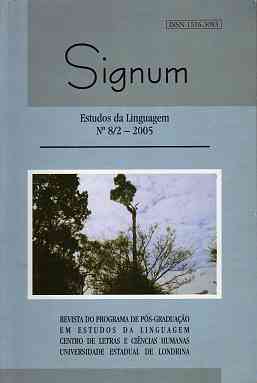Between Conditions and Hypotheses: Empirism and Culture
DOI:
https://doi.org/10.5433/2237-4876.2005v8n2p25Keywords:
Discourse, Conjunction, Condition, Culture.Abstract
The subordinate conjunction if is treated by the traditional grammar as a connective that creates a conditional or hypothetical relation between the sentences. A fact would be a condition or a hypothesis that would have to be become true so that another could be carried be realized. Considered under the perspective of Textual Linguistics, this conjunction is considered as a logical-semantic connective, since, differently from the discursive-argumentative operators, which take are based on the interaction between discourse protagonists, their relations would occur in a properly linguistic point of view. This text presents some reflections on these forms of conception and argues for the existence of at least two if(s), both of a discursive character (one more evidently than the other): the first one would have as a basis the system of reference of the objective world; the second one would have as background the cultural heritage of a social group, which can be evidenced by the fact that only the last one supports an ironic counter-enunciation.
Downloads
Downloads
Published
How to Cite
Issue
Section
License
Copyright (c) 2025 João Carlos Cattelan, Luciane Thomé Schröder

This work is licensed under a Creative Commons Attribution-NonCommercial-NoDerivatives 4.0 International License.
This journal reserves the right to make, in the originals, normative, orthographic and grammatical modifications in order to maintain the standard language and the credibility of the publication. It will respect, however, the authors' style of writing. Modifications, corrections and suggestions of conceptual order will be forwarded to the authors, if necessary. In these cases, the papers, once appropriate, should be submitted to a new appreciation. The final examinations will not be forwarded to the authors. Works published become property of Signum, being its total or partial reprint subject to an explicit authorization of the journal. In all subsequent quotes the original source of publication should be mentioned, in case, in Photographic Discourse. Opinions emitted by the authors are their exclusive responsibility.
















